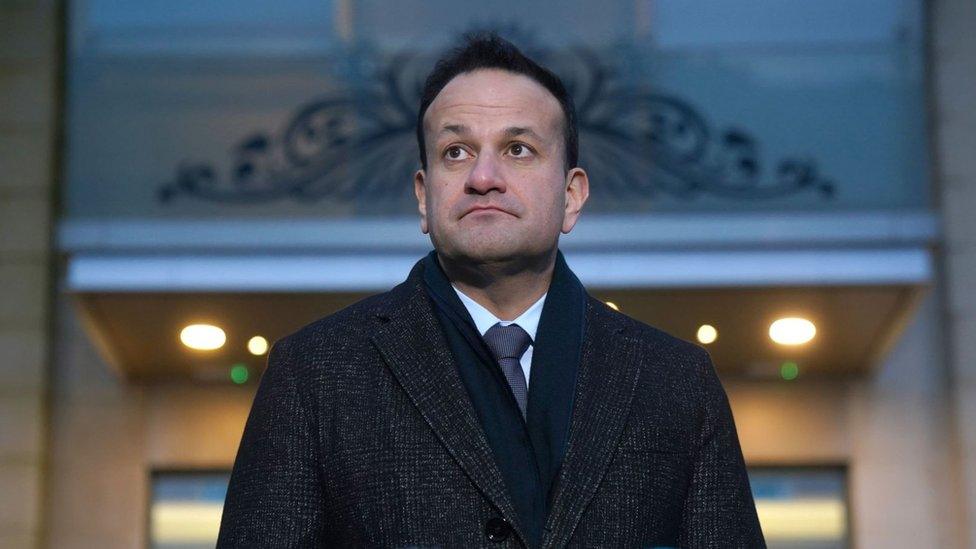NI Protocol: Starmer urges Sunak to use Good Friday Agreement to solve Brexit crisis
- Published
- comments
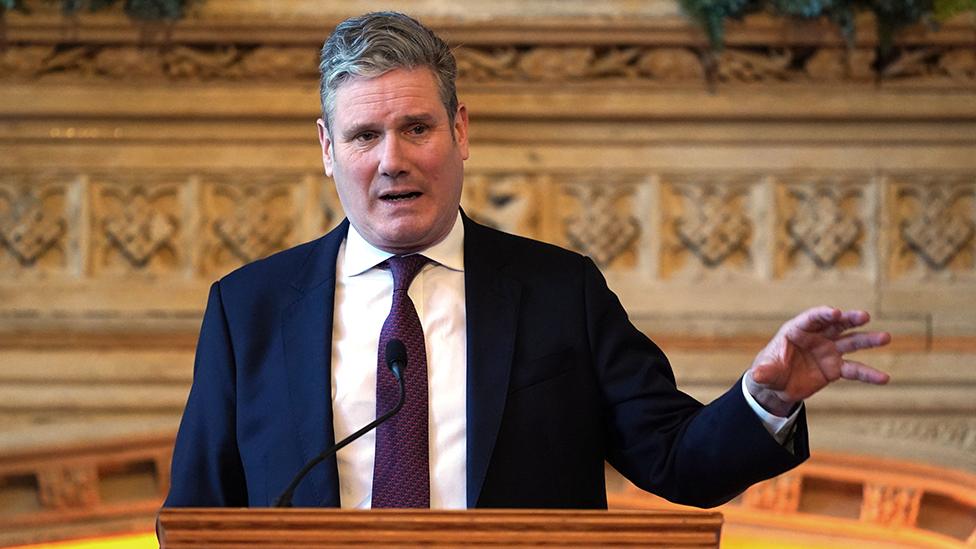
Sir Keir Starmer urged Rishi Sunak to use this year's 25th anniversary of the Good Friday Agreement to "fix minds" on securing a deal
Sir Keir Starmer has urged Rishi Sunak to use the 25th anniversary of the Good Friday Agreement to "fix minds" and resolve the NI protocol dispute.
The Labour leader offered to help get a protocol deal through Parliament if it fails to win enough support from Conservative MPs.
Sir Keir made the commitment during a two-day visit to Northern Ireland.
"The time to put Northern Ireland above a Brexit purity cult which can never be satisfied is now," he said.
The Good Friday Agreement, which helped end decades of conflict in Northern Ireland known as the Troubles, was signed on 10 April 1998.
'Reset and repair'
In a speech at Queen's University Belfast, Sir Keir urged Mr Sunak to break the deadlock with the EU over the protocol, which allows goods to be transported across the Irish land border without checks.
"There is a small window of opportunity before April - we've got to use the anniversary to fix minds, get the country and its political process moving forward again - deliver for the people of Northern Ireland," Sir Keir said.
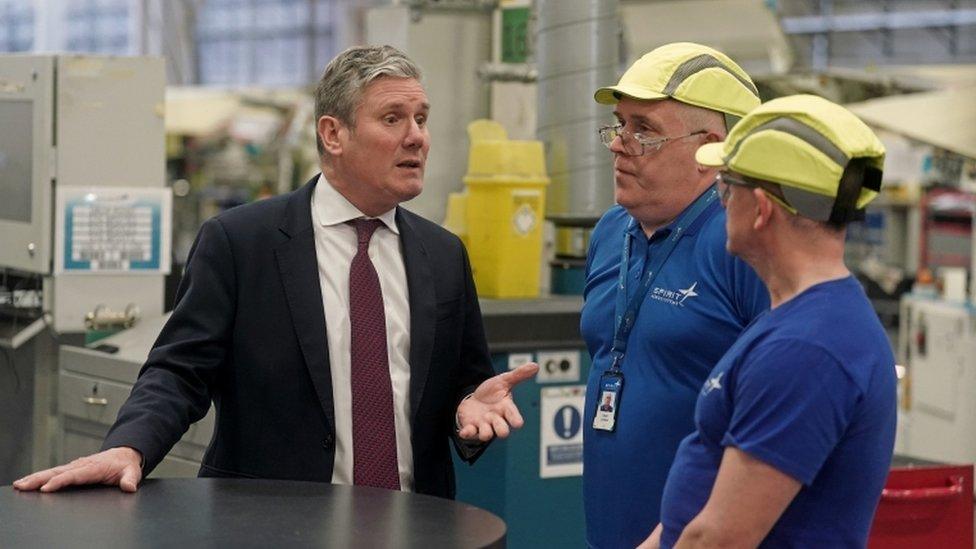
Sir Keir visited Spirit AeroSystems during his visit to Belfast
"If there is a deal to do in the coming weeks, whatever political cover you need, whatever mechanism in Westminster you require, if it delivers for our national interest and the people of Northern Ireland we will support you."
On Thursday, he met political parties at Stormont to discuss the protocol issue, describing those talks as constructive.
Protests by the Democratic Unionist Party against the protocol led to the collapse of Northern Ireland's power-sharing executive last February.
The Labour leader said he would continue to listen to concerns of unionists, including the DUP.
"Of course there will be difficulties, but I do offer support to the government, knowing what the challenges are," he added.
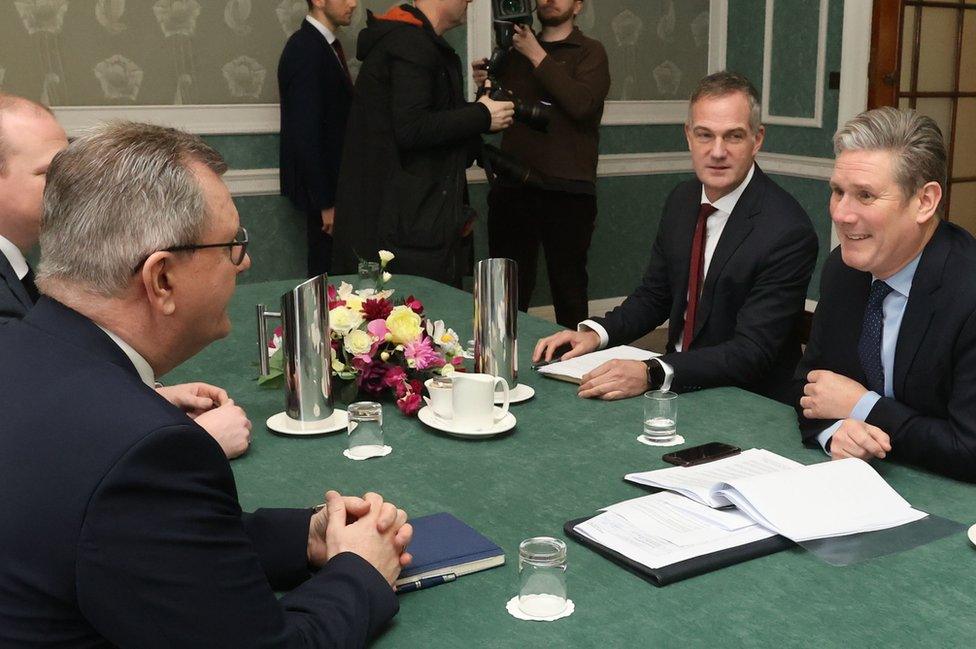
On Thursday, Sir Keir Starmer (right) met senior Northern Ireland politicians, including DUP leader Sir Jeffrey Donaldson (left)
Sir Keir said a priority for an incoming Labour government would also be to "reset and repair" relations with the Irish government.
He also reiterated that if prime minister he would repeal the controversial bill going through Parliament to end investigations into Troubles killings, a proposal NI Secretary of State Chris Heaton Harris said would be "a retrograde step".
On Friday, a No 10 spokesman said they were still working with Brussels to resolve the outstanding issues.
"We continue to work closely with our EU counterparts. It remains our ambition to try to reach an agreement as soon as we can with the EU," the spokesman said. "As the prime minister said before, of course he wants to have a broad range of agreement over the issues we know the protocol is facing."

Sir Keir Starmer has pitched himself as a prime minister in waiting during his talks with local politicians and business leaders.
While he hasn't offered any solutions to the protocol problems, he has offered his support to the government to get a deal through Parliament.
It is an offer the government is unlikely to take up.
With a 70-plus majority in Parliament and two high-profile Brexiteers in Northern Ireland Office ministers Chris Heaton Harris and Steve Baker helping to steer the protocol negotiations, the government is unlikely to meet much internal resistance.
Securing the support of the DUP for any deal agreed with Brussels will be the real challenge.

Talks are taking place between the UK and the EU in an attempt to find a resolution on the protocol.
The UK government has argued the protocol is not working and plans to override most of the agreement if the EU does not agree to changes.
The government set a deadline of 19 January for the parties at Stormont to form a power-sharing executive or face fresh elections.
But the DUP has said it will block the restoration of power sharing until there are significant changes to the protocol.
The deadline, therefore, is highly unlikely to be met next week, which means NI Secretary Chris Heaton-Harris is expected to trigger another three-month period to allow the protocol negotiations to make progress.
Taoiseach (Irish Prime Minister) Leo Varadkar also visited Stormont on Thursday to hold talks with party leaders.
Afterwards, he said there was no guarantee a deal on the protocol would lead to the re-establishment of the Stormont Executive.
Mr Varadkar said the implementation of the protocol "was too strict and too rigid and that created real difficulties".

Why is there a row over the protocol?
Part of the UK's Brexit deal with the EU, the protocol keeps Northern Ireland aligned with the EU's single market for goods, avoiding the need for a hard border with the Republic of Ireland and ensuring free trade can continue.
But it has led to additional checks on some goods moving between Great Britain and Northern Ireland, something the EU accepts is causing difficulties for many businesses.
Most politicians elected to the Stormont Assembly want the protocol to remain, but some unionists say it undermines Northern Ireland's place in the UK.

Shadow NI Secretary Peter Kyle said UK-EU negotiations could tackle all the issues raised by unionists.
"The Labour Party wants to go further," he told Good Morning Ulster.
"We want a veterinary agreement which would tackle agri-products, agri-services and so forth for all of the UK.
"This is really important, because that means that the border for most of the goods and services, most of the goods, would then move from the Irish Sea to the English Channel which would bring back the United Kingdom and we could move forward as a United Kingdom.
"We believe the circumstances are there. They are on the table and they are negotiable so that it can lead to a return of the Stormont executive and the assembly."
DUP leader Sir Jeffrey Donaldson said he hoped there could be an outcome from the talks "that both unionists and nationalists can support".
"That's fundamentally the basis on which power sharing and the executive can be restored," he told Irish broadcaster RTE.

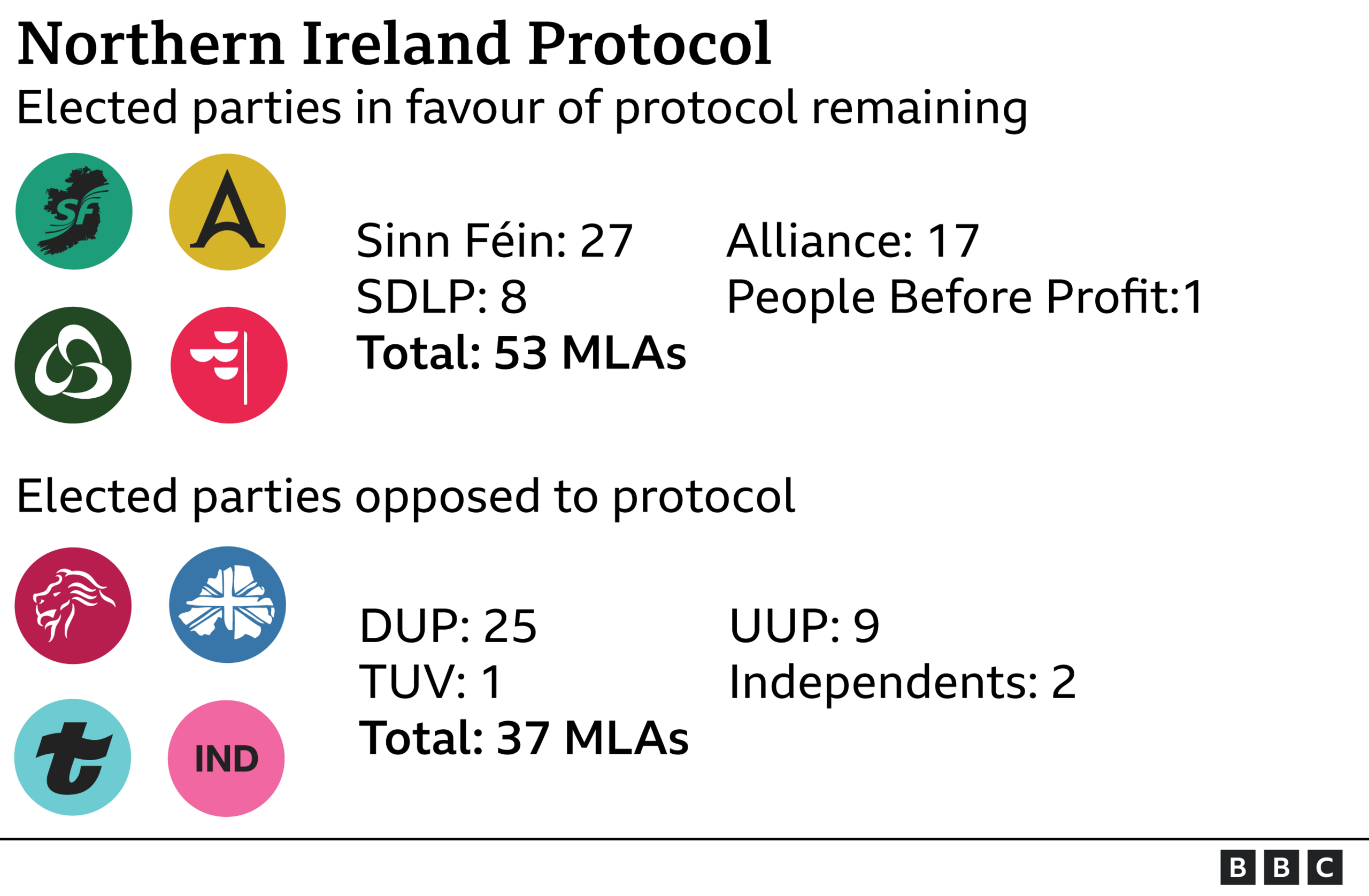
A majority of members of the Northern Ireland Assembly elected in May 2022 are in favour of the protocol, in some form, remaining.
Sinn Féin, Alliance and the SDLP have said improvements to the protocol are needed to ease its implementation.
Unionist politicians want it replaced with new arrangements.

Ulster Unionist Party leader Doug Beattie said the protocol negotiations were were being kept "tight" and that he did not see "much light coming out of them".
However, he added that he appreciated the opportunity to meet both the taoiseach and the Labour leader.
This week's high-profile visits to Belfast of Sir Keir and Mr Varadkar, as well as UK Foreign Secretary James Cleverly, follow a UK agreement with the EU on customs data sharing.
That agreement was reached in talks on Monday between Mr Cleverly and the Vice President of the European Commission, Maros Šefčovič, which both sides said provided a "new basis" for talks.
The Government said it hopes there can be a "broad range of agreement" over any deal with the EU on the problems with the protocol.
A No 10 spokesman said they were still working with Brussels to resolve the outstanding issues.
"We continue to work closely with our EU counterparts. It remains our ambition to try to reach an agreement as soon as we can with the EU," the spokesman said.
"As the Prime Minister said before, of course he wants to have a broad range of agreement over the issues we know the protocol is facing."
- Published2 February 2024

- Published3 April 2023
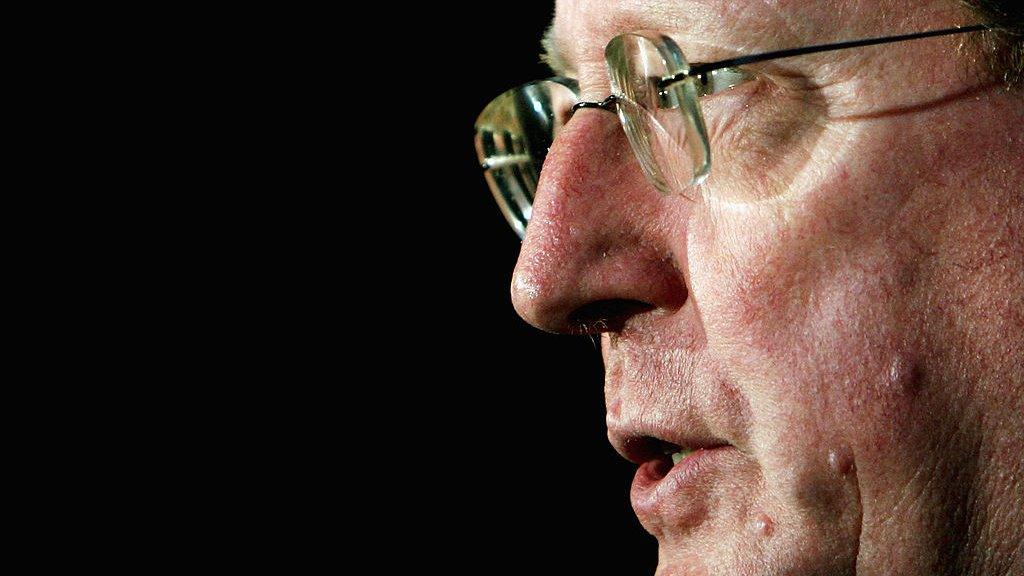
- Published12 January 2023
